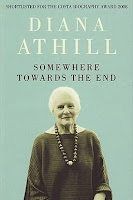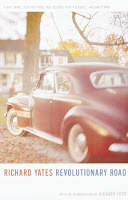 The closest book I can compare Michel Faber’s truly creepy, utterly addictive novel Under the Skin to would be Ishiguro’s Never Let Me Go. I’ve been classifying it as speculative fiction, a book that takes place in a world that looks very much like our own, but slowly reveals itself to be very, very different. Isserley spends her days hunched behind the wheel of a slowly-breaking down vehicle trolling for hitchhikers along the A9 highway in Scotland. Her world is skewed, not only from the giant glasses she wears, but also because of her strange occupation. Little spears in the seat of the car sedate the hitchers once she’s determined whether or not they’ll be missed, and their bodies transported back to a farm where others of her race wait to process the “vodsels.”
The closest book I can compare Michel Faber’s truly creepy, utterly addictive novel Under the Skin to would be Ishiguro’s Never Let Me Go. I’ve been classifying it as speculative fiction, a book that takes place in a world that looks very much like our own, but slowly reveals itself to be very, very different. Isserley spends her days hunched behind the wheel of a slowly-breaking down vehicle trolling for hitchhikers along the A9 highway in Scotland. Her world is skewed, not only from the giant glasses she wears, but also because of her strange occupation. Little spears in the seat of the car sedate the hitchers once she’s determined whether or not they’ll be missed, and their bodies transported back to a farm where others of her race wait to process the “vodsels.”
Slowly over the course of the narrative you learn that Isserley, although she refers to herself as a human being, is quite different from the rest of us who define ourselves by that term. Her body mutilated so she can appear as close to normal in the “vodsel” world atop the earth, she’s in constant pain and her job takes its toll. I don’t want to give away too much of the plot because Faber’s ability to unwind the story over the course of the novel remains its strength. The further along you get, the further you realize how troubled Isserley is — both physically and psychologically.
The only other book by Faber that I’ve read is The Crimson Petal and the White, which, to this day, remains one of the most frustrating reads I’ve ever suffered through. The book sprawled all over the place, tumbled along for almost 1,000 pages (or at least it felt that way), and never came to a satisfying conclusion. The exact opposite is true of Under the Skin. The narrative is crisp and almost cinematic, you feel your own legs cramp as Isserley spends yet another day behind the wheel trolling for her victims. You shake your head as they get in the car. You feel even worse after the book finally reveals exactly what happens to them once they decend into the depths of the world underneath the farm.
To say this book wasn’t what I was expecting would be an understatement. And it’s it just wonderful when that happens?
READING CHALLENGES: Under the Skin is on the 1001 Books list, so it’ll count towards that challenge, and Michel Faber was born in The Hague, The Netherlands, so that’s one for Around the World in 52 Books too.







